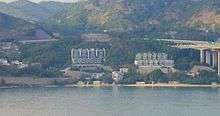Lido Beach (Hong Kong)
Lido Beach (Chinese: 麗都灣泳灘) is located on Castle Peak Road in Ting Kau, New Territories, Hong Kong. It is a gazetted beach, meaning it is managed by the Leisure and Cultural Services Department, which provides lifeguards during the summer months.
| Lido Beach | |
|---|---|
View of Casam Beach (left) and Lido Beach (right) | |
 | |
| Location | Ting Kau, New Territories Hong Kong |
| Length | 200 metres |
| Geology | Beach |
| Access | Castle Peak Road |

The beach is about 200 metres in length, and is located beside the smaller Casam Beach (更生灣泳灘). It sits beside the northern abutment of the Ting Kau Bridge, and also offers views of the Tsing Ma Bridge.
History
A two-storey beach building, housing changing rooms and other facilities, opened at Lido Beach on 1 May 1982.[1] It was built at the same time as the beach building at Kadoorie Beach.[2]
There was a landslide above the beach on 2 July 1997. Eight people, including two patrolling lifeguards, were buried in mud. They survived with injuries.[3][4]
Amid the backdrop of several shark attacks, the Regional Council moved in 1995 to install shark nets at certain beaches. On 7 July 1995 the council decided to extend the shark net programme to Lido Beach, Butterfly Beach, and Tung Wan in Cheung Chau.[5]
Two volleyball courts were set up at the beach in July 2003.[6]
Facilities
- Beach volleyball courts
- Changing rooms and showers
- Toilets
- Tuck shop
Water quality
In early 2003, Lido Beach (along with three other nearby beaches) was closed because the water quality had worsened following the commissioning of Stage 1 of the Harbour Area Treatment Scheme (HATS).[7] While HATS Stage 1 overall improved water quality in Victoria Harbour, it worsened conditions in the western area of the harbour because of the large quantity of non-disinfected effluent being released from the Stonecutters Island Sewage Treatment Works.[8][9]
Despite the closure of the beach, public patronage remained high, with attendance of about 41,071 from March to October 2003. The Public Accounts Committee of the Legislative Council expressed their "grave concern" over the situation, given the health hazard the water quality posed to swimmers, and urged the government to expedite measures to disinfect the effluent from the sewage treatment plant.[6]
Permanent disinfection facilities were built at Stonecutters Island under HATS Stage 2, and water quality subsequently improved. Lido Beach was officially reopened to swimmers on 15 June 2011, and lifeguards are provided there once again.[10]
References
- "Beach bonus". South China Morning Post. 30 April 1982. p. 18.
- "Modern facilities for beaches". South China Morning Post. 13 April 1982. p. 23.
- "The 2 July 1997 Landslide at Lido Beach, Castle Peak Road". Hong Kong Slope Safety. Geotechnical Engineering Office, Civil Engineering and Development Department. 2012.
- Wong, Billy Wai-yuk (3 July 1997). "Victims suddenly swept away". South China Morning Post. p. 3.
- Ng, Kang-chung (8 July 1995). "Council to put up seven more shark nets". South China Morning Post. p. 6.
- "P.A.C. Report No. 42". Legislative Council.
- "Director of Audit's reports, Report No. 42" (PDF). Audit Commission. 31 March 2004.
- "Project Description (Operational Phase Monitoring)". HATS Stage 2A – Provision of Disinfection Facilities at SCISTW. Drainage Services Department.
- "Project Background". Harbour Area Treatment Scheme. Drainage Services Department. Retrieved 5 May 2017.
- "Four beaches in Tsuen Wan to reopen with improved water quality (with photos)". Hong Kong Government. 13 June 2011.
External links
| Wikimedia Commons has media related to Lido Beach. |